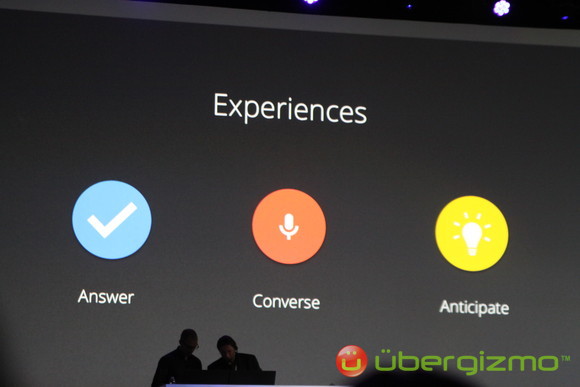 A large chunk of Google’s Keynote was about search, and Google used this rather provocative title above to get our attention. Google as already said in the past that it will go towards “answers” and away from “search”, so this should not come as a shocker. The end-game is that you should be able to ask anything to Google, and it should provide an answer, whether it is from a 3rd party site, or from Google itself. This is something that Google already does for a number of simple queries like weather, currency conversion or various “places”.
A large chunk of Google’s Keynote was about search, and Google used this rather provocative title above to get our attention. Google as already said in the past that it will go towards “answers” and away from “search”, so this should not come as a shocker. The end-game is that you should be able to ask anything to Google, and it should provide an answer, whether it is from a 3rd party site, or from Google itself. This is something that Google already does for a number of simple queries like weather, currency conversion or various “places”.

While that perfect picture is still far in the future, Google is launching its knowledge graph in many new languages, including Chinese (traditional and simplified). Voice Search launched on all platforms via the Chrome browser. This is part of Conversational Search, and the actual feature is called Voice Search. Its basic form exists on Android today, but now, non-Android platforms get support for voice search, and the search itself has become much more powerful. Voice search was about replacing the keyboard. Conversational Search make voice search much more natural and pervasive.
The demonstration worked impressively well and goes way beyond simple voice-to-text search. The conversational search looks like what Apple was trying to do with Siri, except that it seems to be much less limited. Now, we’ll have to try this because although the idea sounded nice, Siri more or less fell flat on its nose, and a lot of people were disappointed by it. What we do know is that the voice recognition of Google works much better than Apple’s (at least in our experience) so this is a solid foundation, and from the Google I/O demo, we think that Google has now leaped over Apple’s Siri in one fell swoop. Google Conversational Search doesn’t try to be your friend our your Tamagochi. It tries to provide solid information.

Finally, the third phase for Google is to anticipate your needs and provide some answers even before you initiate a search. The company does that with Google Now, the Android digital assistant that provides timely information in the form of cards. Although I don’t use it much yet, I have to say that it sometimes surprises me with timely information that’s actually really useful. New information cards about traffic and music have been announced and more will come for sure.
Is this the “end” of Search as we know it? Not really, but this is clearly a diversification of search as we know it. Most likely, some of those searches will cannibalize web search, but more likely, it will extend Google’s reach, and instead of searching in your email for your flight information you will ask Google for your flight information. This is important because it’s not only the nature of search that changes, but Google will probably generate more searches, and therefore more opportunities for revenues.